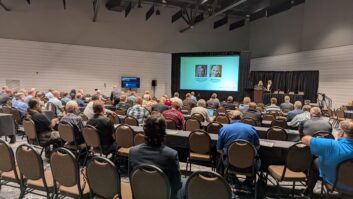Broadcast associations in all 50 U.S. states, including Washington, D.C., and Puerto Rico, have joined together to send a letter to congressional leadership supporting the Nurture Originals, Foster Art and Keep Entertainment Safe (NO FAKES) Act.
The letter is addressed to Speaker of the House Mike Johnson, House Minority Leader Hakeem Jeffries, Senate Majority Leader Chuck Schumer and Senate Minority Leader Mitch McConnell.
In their letter, the state associations say both radio and TV broadcasters are at risk of unauthorized AI-generated recreations,” including the most trusted broadcast news anchors and local on-air personalities.”
To better protect these broadcasters, the groups have endorsed the bill’s provision of safeguards for replicas of human voices and their visual likeness.
The letter, however, also states that the NO FAKES Act will not “unduly restrict” the potential benefits that generative AI can contribute to the broadcast and creative industries in the future.
“At a time when misinformation and disinformation run rampant online and on social media, America’s hometown broadcasters are committed to serving your constituents with trusted local news, information and entertainment programming that brings our communities together,” the state associations said in the letter to congressional leadership. “But nonconsensual voice and image clones can sever that trust, ruin reputations and careers and distort our public disclosure.”
The NO FAKES Act was originally drafted last fall, and bipartisan versions of the bill were introduced in the Senate in July and in the House last week. The legislation aims to create federal protection for people against the unauthorized use of digital replicas using a “readily identifiable” standard. The bill would also grant a right to protection against digital replicas for up to 70 years after an individual’s death.
“And while combatting misinformation, disinformation [and] misappropriation of content and deepfakes is a multifaced problem, the NO FAKES Act is a step in the right direction,” the letter concludes.
The Human Artistry Campaign issued a press release last week with statements from BMI, the RIAA and the Association of American Publishers, among other organizations, backing the bill. “As some unethical AI developers move recklessly forward, Congress must pass this bipartisan legislation,” said Dr. Moiya McTier, a senior advisor to the Human Artistry Campaign. The SAG-AFTRA has also expressed its support of the legislation.
The bill still faces an uphill climb before passage, with concern over First Amendment infringement the bill might impose, including restrictions toward creative expression.
[Read More Radio World Stories About Artificial Intelligence]







